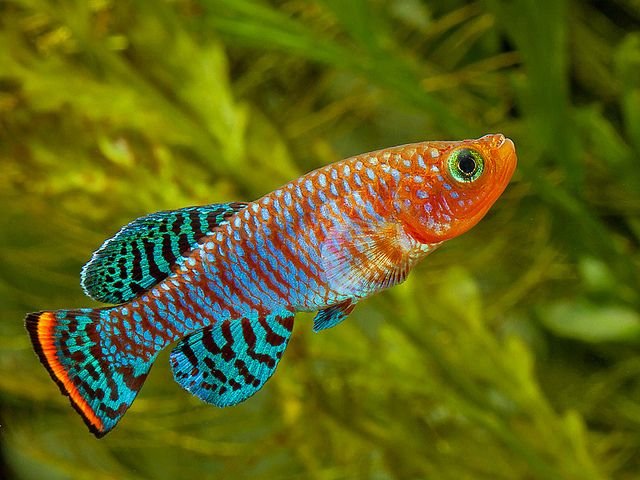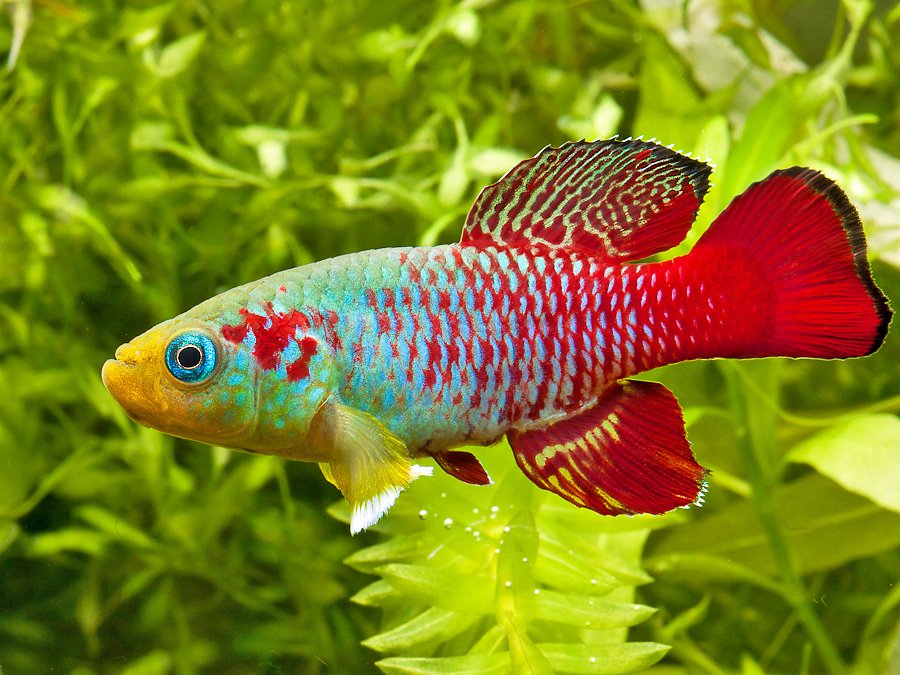There are roughly 1,270 different species of fish that fall under the heading killifish.
They can be found in Africa, Southeast Asia, as well as North and South America.
These are hardy little fish with long, slender bodies. The biggest species grows up to 6 inches (15 centimeters), but most killifish are 1-2 inches long (2.5-5 centimeters).
Similar to livebearers like guppies or platies, they have dorsal fins that are close to their tails and upturned mouths for feeding at the surface.
Unlike livebearers, killifish are egg scatterers, meaning they drop their eggs while they swim near the substrate. Some prefer to lay their eggs on plants while others deposit their eggs directly on the sand or leaf litter at the bottom.
Killifish are often found in blackwater environments that have soft, acidic water.
Most species are sexually dimorphic, meaning the males and females look different from each other. Female killifish are usually drab and unimpressive looking, while the males are flashy and brilliantly colored.
I’ll only discuss the males’ coloration since they’re the ones with the bright colors (sorry ladies).
Annual Killifish
Some species of killifish live in vernal pools, ponds and lakes that appear during a region’s rainy season that later disappear during the dry season.
These species, known as annual killifish, hatch each rainy season when the pools appear and then die each year when the water dries up.
Their eggs survive the harsh dry conditions and hatch out a new generation of killifish when the water returns.
Because these fish have evolved to live in these vernal pools, they have short lifespans, usually no more than a year.
1. Nothobranchius rachovii

- Common name: blue notho, Rachovi Killifish
- Origin: Africa
- Max length: 2.5 inches (6 centimeters)
- Lifespan: 1 year
This is a stunning little fish that is one of the most widely available species in the aquarium hobby. Male blue nothos are a bright metallic red that is speckled all over with a metallic blue. They have showy dorsal and anal fins covered with bands of bright blue.
2. Nothobranchius guentheri

- Common name: redtail notho
- Origin: Africa
- Max length: 2.5 inches (6 centimeters)
- Lifespan: 1 year
The redtail notho is a close cousin to the blue notho. The redtail has larger, more flashy anal and dorsal fins than the bluefin notho that are mostly red instead of blue.
3. Austrolebias bellottii
- Common name: Argentine pearlfish
- Origin: South America
- Max length: 2.75 inches (7 centimeters)
- Lifespan: 8 months
The Argentine pearlfish is really interesting. The body is mostly an iridescent blue-black. Bright metallic blue specks pepper its sides with heavier groupings of speckles on the anal, dorsal and caudal fins.
4. Austrolebias nigripinnis
- Common name: blackfin pearlfish
- Origin: South America
- Max length: 2.75 inches (7 centimeters)
- Lifespan: 8 months
Blackfin pearlfish look very similar to their Argentinian cousins, but with slightly larger anal and dorsal fins. They have the same blue-black base color as the Argentines. But, the speckles on the body line up to form nearly solid vertical stripes.
Semi-annual Killifish
Semi-annual killifish live in waterways that may dry up sometimes, but not every year. They have a longer lifespan of 2-5 years.
5. Fundulopanchax gardneri
- Common name: blue lyretail
- Origin: Africa
- Max length: 2.6 inches (6.5 centimeters)
- Lifespan: 2-3 years
Fundulopanchax gardneri has a metallic blue-green body that is heavily speckled with bright red metallic flecks. It has a lyretail, meaning it has elongated rays on the top and bottom of the caudal fin. These rays have bright yellow stripes. Similar yellow stripes mark the trailing edges of the dorsal and anal fins.
6. Procatopus nototaenia
- Common name: large-finned lampeye
- Origin: Africa
- Max length: 2.5 inches (6 centimeters)
- Lifespan: 2 years
The colors of a large-finned lampeye are somewhat sedate compared to other killifish, but it’s still gorgeous. The body is a shimmery silver iridescent color that can look blue, green or purple, depending on the lighting. It has very showy anal and dorsal fins that have stripes of translucent red and blue.
Non-annual Killifish
These species evolved in permanent waterways that don’t dry up.
7. Jordanella floridae
- Common name: Florida flagfish, American flagfish
- Origin: North America
- Max length: inches ( centimeters)
- Lifespan: 2-3 years
The American flagfish is my absolute favorite killifish. It’s actually a bit hard to describe them. Their bodies are a bright metallic red, but almost every scale has a speckle of iridescent blue-green. They got the name flagfish from how the pattern resembles the field of stars on the American flag.
8. Aphyosemion Bivittatum
- Common name: red lyretail, two stripe lyretail, two-banded killi
- Origin: Africa
- Max length: inches ( centimeters)
- Lifespan: 2-3 years
This little gem is a spectacular fish. Their bodies are silver with an iridescent sheen. They have a line of black speckles that form a rough line that runs nose to tail. They have a huge spade-shaped dorsal fin that is usually a bright orange color with flecks of black. It also has a lyretail and a large, pointed anal fin. Absolutely gorgeous!
9. Pseudepiplatys annulatus
- Common name: clown killifish, banded panchax
- Origin: Africa
- Max length: 1.5 inches (4 centimeters)
- Lifespan: 3-5 years
Clown killifish have bands of black and gold along their bodies. Their anal and dorsal fins are usually fairly small, but sometimes have stripes of bright red. Their tails are spade-shaped with a central stripe of bright red bordered by iridescent blue.
10. Aplocheilus lineatus
- Common name: golden wonder, Werner’s killifish, striped panchax
- Origin: Southeast Asia
- Max length: 2.5 inches (6 centimeters)
- Lifespan: 4 years
Golden wonders are pretty darn adorable. They have these huge eyes that make them seem to have a curious look on their faces. Some are a solid bright iridescent gold but others have stripes or speckling on the back half of their bodies. They do have a small lyretail, but otherwise, their fins are fairly small.
11. Fundulopanchax sjoestedti
- Common name: blue Gularis
- Origin: Africa
- Max length: 5 inches (13 centimeters)
- Lifespan: 3-4 years
The blue Gularis is a very slender-bodied fish. They are a bright red color that’s heavily marked with metallic blue stripes and speckles. But the attraction of this fish is their finnage. They have huge dorsal and anal fins that are covered in patterns of metallic blue. They have an enormous lyretail that has a central stripe that is bright yellow-orange, bordered by more of the bright blue found on the other fins. It also has long, flowing pectoral fins, similar to a Betta.
12. Aphyosemion striatum
- Common name: red-striped killifish
- Origin: Africa
- Max length: 2 inches (5 centimeters)
- Lifespan: 3-5 years
The red-striped killifish has (you guessed it!) red stripes of speckles that run from its nose to tail. It has an irregular pattern of red speckles and stripes along its tail, similar to many fancy guppy varieties.
13. Oryzias woworae
- Common name: Daisy’s ricefish
- Origin: Southeast Asia
- Max length: 1 inches (2.5 centimeters)
- Lifespan: 3-4 years
The Daisy’s ricefish is much less showy than other killifish species, but still very beautiful. Their bodies are a uniform iridescent silver color that may look golden, blue or green, depending on the light.
14. Aphyosemion australe
- Common name: golden lyretail, Cape Lopez lyretail
- Origin: Western Africa
- Max length: 2.5 inches (6 centimeters)
- Lifespan: 3 years
The Cape Lopez lyretail has an orange body with a showy anal fin that sports a thick band of black along the trailing edge. It has a lyretail bordered with bright orange stripes with white tips.
15. Simpsonichthys magnificus
- Common name: magnificus killifish
- Origin: South America
- Max length: 1 inches (2.5 centimeters)
- Lifespan: 2 years
The magnificus killi really lives up to its name. The base color is a pale blue or even pink that’s cut with vertical stripes over the abdomen of the fish. The body is covered with tons of iridescent speckling. It has fairly showy fins that are covered in beautiful patterns of iridescent blue-green that really stand out.
Conclusions
I hope you’ve enjoyed this introduction to some of the different kinds of killifish available in the hobby.
These spunky fish have an almost cult-like following in the hobby. They’re tough little guys that are easy to keep, breed readily and have some of the most amazing colors you’ll ever see.
Believe me, even the best HD photos don’t do killifish justice. When you see them in person, their bright metallic flash will blow your mind.
I wish you and your fish all the best!

thankyou for sharing this with me, james.